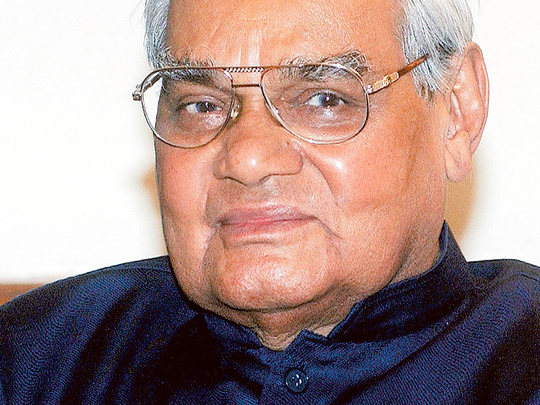
NEW DELHI: As Atal Behari Vajpayee turns 90 on December 25, he remains one of the finest practitioners of India’s enlightened pluralism as embedded in its ancient civilisation. Vajpayee, now a shadow of his former self, has straddled public life before and after India’s independence since 1942. He is the last of the generation of leaders whose worldview is avowedly Indian and therefore universal.
Vajpayee was born to Krishna Devi and Krishna Bihari Vajpayee on December 25, 1924 in a middle-class Brahmin family in Gwalior. His father was a poet and schoolmaster in his hometown. Vajpayee studied at Gwalior’s Saraswati Shishu Mandir and Victoria College and graduated with distinction in Hindi, English and Sanskrit. He completed his post-graduation in Political Science from Dayanand Anglo-Vedic College, Kanpur, and was awarded a first-class degree.
In 1951, he was seconded by the Rashtriya Swayamsevak Sangh (RSS), along with Deendayal Upadhyaya, to work for the newly formed Bharatiya Jana Sangh. In 1957, Vajpayee was elected to Lok Sabha from Balrampur. By virtue of his oratorial skills, he became the face of the Jana Sangh. In 1977, heeding the call of social reformer Jayaprakash Narayan for all the opposition parties to unite against the Congress, Vajpayee merged the Jana Sangh into the newly formed grand-alliance, the Janata Party. Following Janata’s victory in the 1977 general elections, he became the Minister of External Affairs in Prime Minister Morarji Desai’s cabinet.
The Janata Party was dissolved soon after Morarji Desai resigned as Prime Minister in 1979. Vajpayee joined many of his Bharatiya Jana Sangh and RSS colleagues to form the Bharatiya Janata Party (BJP) in 1980. BJP grew in strength in the early nineties riding on pro-nationalistic sentiments. In the 1996 general elections, BJP emerged as the single largest party in the Lok Sabha. Then President Shankar Dayal Sharma invited Vajpayee to form the government. Vajpayee was sworn in as the 10th Prime Minister of India, but the BJP failed to muster enough support from other parties to obtain a majority. He resigned after 13 days, when it became clear that he could not garner a majority.
After the fall of the two United Front governments between 1996 and 1998, the Lok Sabha was dissolved and fresh elections were held. The 1998 general elections again put the BJP ahead of others. This time, a cohesive bloc of political parties joined the BJP to form the National Democratic Alliance (NDA), and Vajpayee was sworn in as the Prime Minister.
The NDA proved its majority in the parliament. The government lasted 13 months until mid-1999 when the All India Anna Dravida Munnetra Kazhagam (AIADMK) under J Jayalalitha withdrew its support to the government. The government lost the ensuing vote of confidence motion in the Lok Sabha by a single vote on April 17, 1999. As the Opposition was unable to come up with the numbers to form the new government, the Lok Sabha was again dissolved and fresh elections were held.
In the 1999 general elections, the BJP-led NDA won 303 seats out of the 543 seats in the Lok Sabha, in the aftermath of the Kargil operations, thereby securing a comfortable and stable majority. On 13 October 1999, Vajpayee took oath as Prime Minister of India for the third time.












